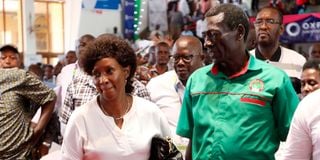Premium
Knut: Increase allocations for primary, junior, senior schools

Teachers Service Commission CEO Nancy Macharia (left) and Kenya National Union of Teachers Secretary-General Collins Oyuu (right) during the third day of the 20th Kenya Primary Schools Head Teachers Association conference in Mombasa in November.
What you need to know:
- Knut also wants TSC to honour its pledge to employ interns on permanent terms.
- Learning institutions are hindered from implementing their programmes because funds are too low or delayed, according to Knut.
The Kenya Union of Teachers (Knut) has demanded a significant increase in funds the government sets aside for each learner in primary, junior and senior secondary schools,saying the current allocations are too low.
Knut Secretary-General Collins Oyuu said yesterday that the current allocations for pre-primary, primary, junior and senior secondary schools; as well as special needs education, which are either delayed or insufficient, hinder the learning institutions from effectively implementing their programmes due to financial distress.
“Free Primary Education funds and Free Day Secondary Education allocations are either delayed unnecessarily or allocated in small bits that cannot enable schools to carry out their programmes. This leads to financial crises in the affected institutions. Schools are ever in financial crises because heads of institutions are not trained in financial management,” Mr Oyuu told journalists during a press conference at the union’s head office yesterday.
For pre-primary learners, who currently receive Sh1,170 per pupil per annum, the union proposes an increase to at least Sh5,000 per pupil.
For primary schools, the unions want each pupil allocated Sh4,000, up from the current Sh1,420.
Knut wants junior secondary school students, who currently receive Sh15,544, to get at least Sh22,000, while those in senior secondary school to get at least Sh35,000, up from Sh19,628.
“For senior secondary school learners, the current allocation is Sh19,628 per student. The union insists that this amount should be raised to Sh35,000, noting that, before the split into senior and junior secondary, learners were allocated Sh22,244,” Mr Oyuu said.
Further, the union insisted that special needs learners, currently allocated Sh18,000 per learner, should be given at least Sh35,000.
“The current allocations per student are a drop in the ocean, considering the escalating cost of living, and the pricey cost of teaching tools and learning materials,” said Mr Oyuu.
Knut further insisted that the Teachers Service Commission (TSC) honours its pledged to convert the current 46,000 intern teachers to permanent and pensionable status.
“Given that these intern teachers have served well and with distinction, TSC should, without subjecting them to any other prejudice, convert them to permanent and pensionable terms upon expiry of their contractual period. These teachers must be given first priority in the impending hiring of teachers in 2024,” said Mr Oyuu.
On Friday last week, TSC revealed that 46,000 intern teachers who were recruited this year will have their contracts extended in January for one more year before they are made permanent and pensionable employees in 2025.
The union further defended primary headteachers against junior school teachers posted from secondary schools.
Mr Oyuu lamented that demoting a headteacher back to a classroom position is “an unfeasible and unprecedented measure.”
He called for a restructuring that aligns with the evolving educational landscape.
"The concept of demarcation is absent from the Constitution; instead, let's examine the Labour Act. We won't permit actions based on assumptions.”
“Though we've been silent, don't mistake it for docility. We will not tolerate it any longer; the notion, therefore, that they have no capacity to teach junior school is absurd, disrespectful, and dishonest and an abuse to them,” said Mr Oyuu.





